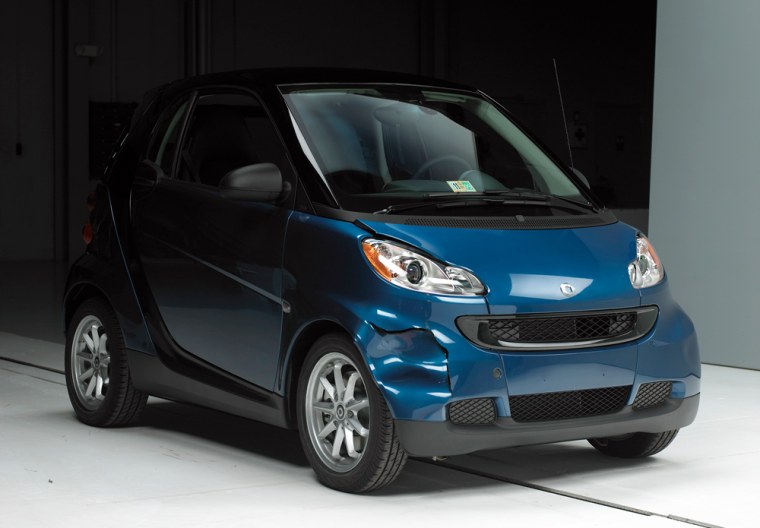Even a fender-bender in a fuel-efficient mini car can lead to thousands of dollars worth of repairs, the insurance industry found in new crash tests.
The Insurance Institute for Highway Safety reported Thursday that repairing damage to microcars in low-speed crashes of 3 to 6 miles per hour could cost anywhere from $474 to $3,701.
The Institute conducted low-speed crash tests on the front and back bumpers and the front and rear corners of seven 2009 model year mini cars that have become more widely available with rising fuel costs in recent years.
The Kia Rio racked up the most damage among the tiny cars, $3,701 in repairs to the full front bumper. In the four tests, the Rio averaged $2,705 in damages.
The Smart Fortwo had the lowest average bill of $899 among the seven vehicles tested. In one test, damage to the rear corner of the Fortwo cost $507. The Chevrolet Aveo had the second-lowest bill, an average of $1,155 in damages for the four tests.
Among the other vehicles tested, the Hyundai Accent averaged $2,123 in damages, the Honda Fit racked up $1,960 in repairs and the Toyota Yaris would have led to an average bill of $1,951. Tests to the bumpers of the Mini Cooper generated average damages of $1,637.
Institute senior vice president Joe Nolan said bumpers should be designed to protect vehicle parts such as grilles and headlights. Damages should cost less than the typical $500 insurance deductible for a collision, he said.
"When you reach $1,000 (in damages) the bumper isn't doing its job, and anything $1,500 or higher is egregious," Nolan said.
Automakers said the insurance industry tests were more focused on repair costs of low-impact, low-injury collisions while their companies placed a greater priority on safety. They noted that none of the seven vehicles tested received the institute's top rating, which requires a manufacturer to hold its average repair cost to less than $500.
Kia spokesman Alex Fedorak said the Rio "complies with all federal government vehicle safety standards" and offers a long list of standard safety technology.
Honda said in a statement that it "strives to provide customers with products designed and built to achieve the highest levels of quality and safety, while also providing low operating costs and good overall value."
